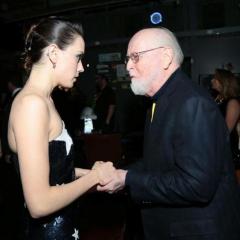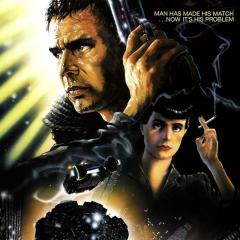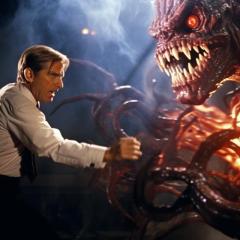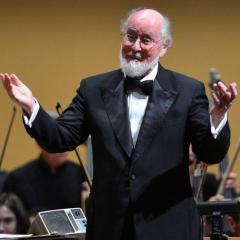-
Posts
964 -
Joined
-
Last visited
-
Days Won
1
Reputation Activity
-
 Score got a reaction from bollemanneke in Harry Potter - The John Williams Soundtrack Collection 7CD boxset from La-La Land Records (2018)
Score got a reaction from bollemanneke in Harry Potter - The John Williams Soundtrack Collection 7CD boxset from La-La Land Records (2018)
Everything would be much simpler if LLL just released those titles in more normal periods of the year. Everyone knows that post and couriers are overloaded in December, and the chance of a mess happening is higher.
-
 Score reacted to Thor in Theme from ”Schindler’s List” (1993), arranged for piano/cello/violin trio by John Williams
Score reacted to Thor in Theme from ”Schindler’s List” (1993), arranged for piano/cello/violin trio by John Williams
Wait, what about Emanuel Ax? I'd love to hear him record a Williams piece.
-
 Score got a reaction from TolkienSS in Are There Any Film Composers Working Who Can’t Read/Write Music?
Score got a reaction from TolkienSS in Are There Any Film Composers Working Who Can’t Read/Write Music?
I think it would be better to define what it means to "read music". I can see at least three possible definitions, corresponding to different levels of musical training (and I'm just thinking about "reading", not "writing" or "playing from a score").
1) Being able to identify the name of a note while reading a single staff in G clef. This is a basic ability that in some countries is taught in ordinary schools, and I will never believe that any serious professional musician is unable to do this, even if they say so themselves.
2) Being able to read written music on a single staff (say, a melody) and simultaneously imagining how the melody sounds, at least in terms of relative heights of the notes; possibly, being able to sing a previously unknown melody while reading it for the first time. This is a slightly more advanced ability, which requires a few years of musical training, and dedicated practice. Where I live, in the context of a formal musical education path, you are typically required to display such ability within the second year, and you must give an exam where said ability is tested (along with others) at the end of the third year. I can well imagine that the Beatles might not be able to do this, but I find it difficult to believe that people like Zimmer, Elfman etc. - who, after all, often deal with written music and musicians who play their compositions - cannot do it.
3) Being able to read a full multi-instrumental score (many staves aligned vertically, corresponding to different instruments playing simultaneously) of moderate complexity and simultaneously imagine how it sounds, at least in relative terms. This requires several years of training and practice specifically oriented to achieve this goal; it is the bread and butter of orchestra conductors, of those composers who write everything by themselves, and of orchestrators. So, John Williams, Jerry Goldsmith, Ennio Morricone, Bernard Herrmann etc. etc. etc. are/were able to do it; people like Zimmer and Vangelis most likely not.
I have to disagree with this. Most of the music that most of us love would not exist without music theory; including that of John Williams. Of course, music theory evolved in time, and today's theory is different, say, from that of Mozart's times.
-
 Score got a reaction from JTN in Are There Any Film Composers Working Who Can’t Read/Write Music?
Score got a reaction from JTN in Are There Any Film Composers Working Who Can’t Read/Write Music?
I think it would be better to define what it means to "read music". I can see at least three possible definitions, corresponding to different levels of musical training (and I'm just thinking about "reading", not "writing" or "playing from a score").
1) Being able to identify the name of a note while reading a single staff in G clef. This is a basic ability that in some countries is taught in ordinary schools, and I will never believe that any serious professional musician is unable to do this, even if they say so themselves.
2) Being able to read written music on a single staff (say, a melody) and simultaneously imagining how the melody sounds, at least in terms of relative heights of the notes; possibly, being able to sing a previously unknown melody while reading it for the first time. This is a slightly more advanced ability, which requires a few years of musical training, and dedicated practice. Where I live, in the context of a formal musical education path, you are typically required to display such ability within the second year, and you must give an exam where said ability is tested (along with others) at the end of the third year. I can well imagine that the Beatles might not be able to do this, but I find it difficult to believe that people like Zimmer, Elfman etc. - who, after all, often deal with written music and musicians who play their compositions - cannot do it.
3) Being able to read a full multi-instrumental score (many staves aligned vertically, corresponding to different instruments playing simultaneously) of moderate complexity and simultaneously imagine how it sounds, at least in relative terms. This requires several years of training and practice specifically oriented to achieve this goal; it is the bread and butter of orchestra conductors, of those composers who write everything by themselves, and of orchestrators. So, John Williams, Jerry Goldsmith, Ennio Morricone, Bernard Herrmann etc. etc. etc. are/were able to do it; people like Zimmer and Vangelis most likely not.
I have to disagree with this. Most of the music that most of us love would not exist without music theory; including that of John Williams. Of course, music theory evolved in time, and today's theory is different, say, from that of Mozart's times.
-
 Score reacted to Marian Schedenig in Theme from ”Schindler’s List” (1993), arranged for piano/cello/violin trio by John Williams
Score reacted to Marian Schedenig in Theme from ”Schindler’s List” (1993), arranged for piano/cello/violin trio by John Williams
As "serious music appreciation" milestones go, Mutter/Argerich/Maisky is probably in a similar league as being performed at the Salzburg festival.
-
 Score reacted to Miguel Andrade in Theme from ”Schindler’s List” (1993), arranged for piano/cello/violin trio by John Williams
Score reacted to Miguel Andrade in Theme from ”Schindler’s List” (1993), arranged for piano/cello/violin trio by John Williams
Another performance with Martha Argerich, Misha Maisky and Anne-Sophie Mutter
-
 Score reacted to Tom in Will JW score the Rey Skywalker movie?
Score reacted to Tom in Will JW score the Rey Skywalker movie?
I could see him doing a title card piece with Rey's theme as the basis--maybe a couple of other themes. The probability of him scoring the whole movie is the same as the probability of me watching this movie.
-

-
 Score got a reaction from karelm in The Classical Music Recommendation Thread
Score got a reaction from karelm in The Classical Music Recommendation Thread
Besides Puccini and Verdi roles, Pavarotti also left unforgettable interpretations of Mascagni's "Cavalleria Rusticana" and Leoncavallo's "Pagliacci", the two works that, together with Puccini's operas, are the most widely recognized masterpieces of the "Verismo" movement. The core of "Pagliacci" is this desperate aria, which Pavarotti impersonates perfectly:
Here is a small curiosity, since we are among film music fans: I don't know if it is widely known outside Italy or not, but many years ago Pavarotti had a collaboration also with Michael Kamen (in addition to the well known one with John Williams on "Yes, Giorgio"). Pavarotti was invited by Zucchero (a famous pop/blues singer) to duet with him on his song "Miserere", and Michael Kamen wrote the orchestral arrangement. Here is a performance with all of them, including Kamen conducting the orchestra:
I think it's a nice piece (the arrangement is superb as well).
-
 Score reacted to Loert in The Classical Music Recommendation Thread
Score reacted to Loert in The Classical Music Recommendation Thread
Pavarotti and the rest of the singers are great, but the orchestra is on absolute top form in that recording as well. It's one of the best orchestral performances I've ever heard.
I made my own version of Turandot where I attach the Alfano ending to that recording. I tend to think that if you're going to be pompous, then you may as well go all the way!
-
 Score reacted to karelm in The Classical Music Recommendation Thread
Score reacted to karelm in The Classical Music Recommendation Thread
These are titans. I think 90% of people who like opera first encountered it through them. They are very, very good at this repertoire.
This is not exactly what Puccini wrote, this is Pavarotti showcasing his talent above Puccini. Seriously, did anyone ever sing Nessun Dorma so incredibly?? That penultimate note he sustains indefinitely is NOT in the score. It's a 16th note. This is his version of it and is the standard to which all others are compared to.
-
 Score got a reaction from karelm in The Classical Music Recommendation Thread
Score got a reaction from karelm in The Classical Music Recommendation Thread
That looks like a great setup of singers, and Mehta is a great conductor (several operas in the Sony box are conducted by him, by the way).
I guess that, in general, any recording of Puccini or Verdi that involves Pavarotti should be recommendable!
-
 Score reacted to karelm in The Classical Music Recommendation Thread
Score reacted to karelm in The Classical Music Recommendation Thread
I think very highly of Mehta's recording with Pavarotti. It is very well performed and recorded and features the legendary Pavarotti singing his signature tune.
Giacomo Puccini, Zubin Mehta, London Philharmonic Orchestra, Luciano Pavarotti, Joan Sutherland, John Alldis Choir, Montserrat Caballé, Tom Krause, Nicolai Ghiaurov, Peter Pears - Puccini - Turandot / Sutherland · Pavarotti · Caballé · Ghiaurov · Krause · Pears · LPO · Mehta - Amazon.com Music
-
 Score got a reaction from Schilkeman in The Classical Music Recommendation Thread
Score got a reaction from Schilkeman in The Classical Music Recommendation Thread
Definitely. The good thing with Puccini, in extreme synthesis, is that he managed to combine what's great in Verdi and what's great in Wagner, also incorporating more modern tendencies proper of the first two decades of the 20th century. For example, he and Stravinsky influenced each other in both directions, and it shows up in Turandot. My problem (and not only mine) with that opera is the ending of the story, which may be considered to be "morally unsatisfactory". Liu sacrifices herself for love to save Calaf's life, there is a dramatic moment of general mourning (the last, beautiful piece completed by Puccini before dying) and just a few minutes later, Calaf and Turandot declare their mutual love as if Liu's death meant nothing to Calaf, and the chorus ends up singing: "O Sun, o Life, o Eternity! Love shines over the world! Our infinite happiness laughs and sings in the Sun! Glory, glory glory!" on a fully triumphant setting of the "Nessun dorma" music. I'm quite sure that Puccini would have tried to change the libretto for the last scene, if he had lived, and he would have written a different music!
@Schilkeman was asking for recommendations on the best recordings, though, and I'm not an expert on that. I have Sony's complete Puccini box set, plus a couple of individual recordings of Turandot and Tosca, and I'm very happy with all of them, but I never bought other versions to compare performances.
-
 Score reacted to Yavar Moradi in The Classical Music Recommendation Thread
Score reacted to Yavar Moradi in The Classical Music Recommendation Thread
I'll echo the recommendation of Turandot. For me by far his best and most advanced work, even if he didn't quite finish it.
Similarly for me Rachmaninov's last orchestral work the Symphonic Dances (basically a "Dance Symphony"... don't think of it as a ballet or anything) is his most advanced and interesting/engaging.
Yavar
-
 Score got a reaction from Yavar Moradi in The Classical Music Recommendation Thread
Score got a reaction from Yavar Moradi in The Classical Music Recommendation Thread
Check out the last movement, "In Paradisum", from Duruflé's Requiem. It exists in several different (original) orchestrations, the full orchestral one is here:
The movement I'm referring to starts at 37:00. I'll not tell you how it ends before you've listened to it
You can start with Turandot and Tosca, and then listen to all the rest!
From the musical point of view, Turandot is the most advanced of his whole production - it was also his last opera, sadly unfinished. Tosca has a more consistent storyline, though (and excellent music anyway).
-
 Score reacted to Schilkeman in The Classical Music Recommendation Thread
Score reacted to Schilkeman in The Classical Music Recommendation Thread
I should have been more specific. I’m looking for recording recommendations. I’m aware of his operas, I just don’t know what the good recordings are.
-
 Score reacted to Jurassic Shark in The Classical Music Recommendation Thread
Score reacted to Jurassic Shark in The Classical Music Recommendation Thread
Yes, I only recommend the complete operas.
-
 Score got a reaction from Falstaft in [GAME] Sheet music extract : find the score
Score got a reaction from Falstaft in [GAME] Sheet music extract : find the score
Maybe not! The CD track is actually edited and is a bit different from what the score dictates. The first bar is completely edited out, and the written score has there a loud trumpet combination that is a red herring, because you look for it and don't find it in the recording. Props to @Falstaft for identifying it despite this.
And by the way, what a piece! I hadn't listened to it in a while.
-
 Score reacted to Pat_S in [GAME] Sheet music extract : find the score
Score reacted to Pat_S in [GAME] Sheet music extract : find the score
I'm hoping this is a tricky one? My notation is a bit messy but I tried my best haha
-
 Score reacted to Falstaft in [GAME] Sheet music extract : find the score
Score reacted to Falstaft in [GAME] Sheet music extract : find the score
Figured it out! DANG this was hard, well done, @Pat_S
-
 Score got a reaction from JTN in Jerry Goldsmith's MACARTHUR (1977) - NEW! 2023 Intrada 2-CD
Score got a reaction from JTN in Jerry Goldsmith's MACARTHUR (1977) - NEW! 2023 Intrada 2-CD
"We will return", referencing "I shall return" from MacArthur's speech. More than subtle, I'd say impossible!
-
 Score reacted to Jay in Jerry Goldsmith's MACARTHUR (1977) - NEW! 2023 Intrada 2-CD
Score reacted to Jay in Jerry Goldsmith's MACARTHUR (1977) - NEW! 2023 Intrada 2-CD
His soundtrack will return... on Tuesday, December 12.
https://filmscoremonthly.com/board/posts.cfm?threadID=152756&forumID=1&archive=0
-
 Score reacted to Yavar Moradi in New details on Williams / Ross Dial Of Destiny collaboration via new LA Times article by Tim Greiving
Score reacted to Yavar Moradi in New details on Williams / Ross Dial Of Destiny collaboration via new LA Times article by Tim Greiving
I agree it's very good (in fact I would say fairly underrated, thanks to the disappointing original album Varese put out which was half low key suspense scoring) but it's still the least of Goldsmith's Star Trek scores overall, in my opinion. It has the most skippable cues out of all of them, and I really blame the terrible film itself for that. It rarely allowed Jerry to let loose, but when it did (like the second half of "Odds 'n' Ends", hoo boy did Jerry kick ass. But still, I would have been sad if such an overall downbeat work for an offensively terrible movie had been Jerry Goldsmith's final film score. Looney Tunes is a much more inspiring end. I mean, can you believe a guy in his mid-70s dying of cancer wrote this incredible one-two punch of complex action gems??
Seriously, what a way to go out! Brilliantly channeling Carl Stalling and making it work with his own complex action style, while also recalling his heyday of scoring western films in the 60s and 70s...
Yavar
-
 Score got a reaction from Yavar Moradi in The Official Quartet Records Thread
Score got a reaction from Yavar Moradi in The Official Quartet Records Thread
In addition to "Romeo and Juliet", a great one, I also suggest "Il Gattopardo" ("The Leopard"). Very late-1800-esque, so much that at points it could be mistaken for something written by Tchaikovsky or Verdi (besides the one dance piece that was actually written by Verdi). Several very beautiful themes, and 3 or 4 nice setpieces.







